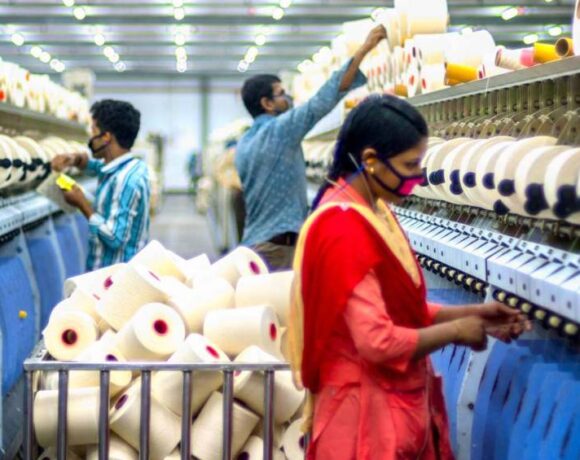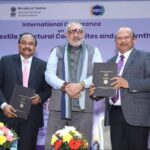Textile Ministry Drawing Roadmap To Take Industry To The Next Level

The Union textile ministry is in the process of creating a comprehensive roadmap which, on the one hand, aims to address on dealing with a wide range of existing issues hampering the growth and, on the other hand, it aims to chart an action plan to achieve the targeted growth strategies in a more inclusive manner across the value chain.
The roadmap is expected to have a multi-pronged approach spread over short, medium and long term goals. The ministry is of the view that it is high time that the domestic textile and apparel sector transitions adequately to align with global challenges and requirements and addresses the need for building up capacities that can suitably live up to the transforming demand of the world market.
The Union ministry is also contemplating putting on fast track various existing schemes ranging from PM Mitra Parks to PLI scheme, as also various policy initiatives in order to ensure time-bound implementation of these schemes and achieve desired outcome. The aim is to make the industry competitive and robust so that it caters not only to the global market but also meet the aspiring requirements of the domestic market.
The ministry has set a target of growing the industry to $350 billion by 2030 and create job opportunities for 60 million people. The ministry is also looking to create world class capabilities and capacities for technical textiles through the National Technical Textiles Mission (NTTM) with the aim of taking the exports of these high-performance specialised textiles to $10 billion by 2030.
“The National Technical Textiles Mission is a game-changer for our textile industry. It is driving innovation, creating employment opportunities and significantly boosting our economy. This mission is a testament to our commitment to making India a global hub for technical textiles,” states Giriraj Singh, Union Textile Minister.
“In the last decade or so, like any other industry, the textiles and apparel sector has also undergone a change globally. Now apart from producing textiles goods competitively, the buyers are today seeking information about the entire value chain, beginning from the origin of raw material. They want to know how sustainably we manufacture our goods and what our plans are in terms of circularity goals,” states Chandrima Chatterjee, Secretary General, Confederation of Indian Textile Industry (CITI).
“All these issues are becoming utmost critical for all of us as we set our targets for future, and hence we need a more comprehensive approach. The Union textile ministry under the leadership of Giriraj Singh has taken fresh cognisance of all these issues and has decided to come up with a comprehensive roadmap,” adds Chatterjee.
“Textile Minister Giriraj Singh has taken a fresh look on various issues that are adversely impacting the growth of the industry. Post his initiative, the ministry is preparing this roadmap which in the current scenario is paramount to deal with the emerging challenges. In fact, we need to have an integrated approach to address these headwinds and prepare a roadmap that can take our industry to the next level,” says Sanjay Jain, Managing Director, TT Ltd.
Industry experts are of the view that since the industry is undergoing transition, there is need to deal with the issues differently. It is required to adapt to international standards in sustainability, innovations and quality and the alignment calls for integration of advanced technologies, strict commitment to environmental regulations and expansion of strategic partnerships with global leaders. They believe that policy makers will have to incorporate all these into their agenda going forward.
With sustainability and circularity becoming crucial aspects of responsible manufacturing of textiles and apparel, brands and manufacturers are now engaging a lot on how they can help their supply chain partners get decarbonized through energy efficiency, transition to renewable energy, water efficiency to save water and replacing chemical dyes and chemicals with more sustainable alternatives.
In response to growing awareness, governments worldwide are implementing laws to regulate the industry from an environmental standpoint. Measures such as PEF-CR, EPR, Ecodesign EU Green Deal, and BRSR are being introduced, with the EU’s CBAM imposing fines and penalties on unsustainable goods. Although textiles are currently excluded from CBAM, discussions suggest their inclusion in the future.
Meanwhile, the domestic textile sector has also taken steps in enhancing transparency by adopting traceability tools and certifications that provide buyers with visibility into the entire supply chain. The Indian government has also introduced various certifications like GOTS – Global Organic Textile Standard, which is an official indication of the textile standards. In fact, adherence to these practices and compliance with international standards ensures good governance with international partnerships.















